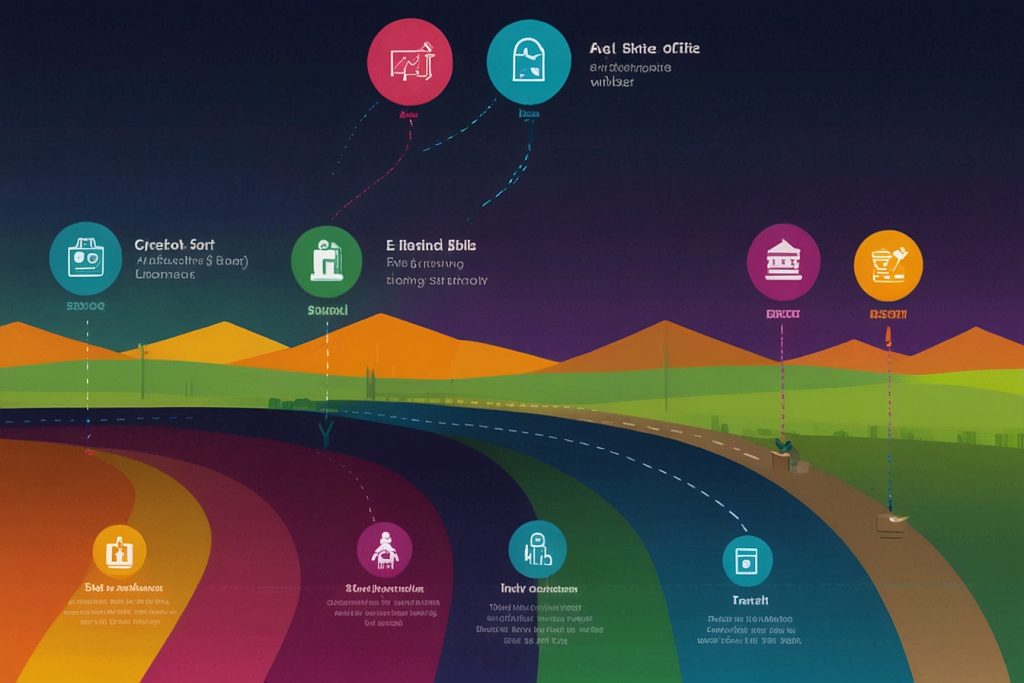Mastering Credit Literacy: From Understanding to Enhancing and Advancing Credit Knowledge
April 24, 2024 | neartous
- Finance

Understanding Credit Scores and Reports: The Foundation of Financial Health
As markers of a person’s creditworthiness and financial responsibility, credit scores and reports are essential parts of personal finance. We’ll go over the fundamentals of credit reports and scores in this section, as well as their importance and how they affect different facets of financial life.
Credit scores are numerical indicators of a person’s creditworthiness that usually range from 300 to 850. Credit reports, which include comprehensive details of a person’s credit history, including credit accounts, payment histories, outstanding debts, and public records like bankruptcies or liens, are the source of the information used to calculate them.
Key Components of Credit Scores
Several factors contribute to the calculation of credit scores, with the following being the most influential:
- Payment History: On time credit account payments show good credit management and have a favorable effect on credit scores.
- Credit Utilisation Ratio: The proportion of available credit being used, with lower utilization ratios typically leading to higher scores.
- Length of Credit History: Longer credit histories tend to result in higher scores, as they provide more data for assessing creditworthiness.
- Types of Credit: A diverse mix of credit accounts, including credit cards, instalment loans, and mortgages, can contribute positively to scores.
- New Credit Inquiries and Accounts: Numerous recent inquiries or newly opened accounts may suggest financial distress and could lower scores.
Significance of Credit Scores
Credit scores play a crucial role in various financial transactions and decisions, including:
- Loan Approval: Credit scores are used by lenders to evaluate the risk of making loans to specific people and make the decision about whether to approve loan applications.
- Interest Rates: Loan and credit card interest rates are influenced by credit scores; higher scores are often associated with lower rates.
- Applications for Rentals: Credit ratings can be used by landlords to assess the financial stability and rent-paying capacity of potential renters.
- Insurance Premiums: Insurers may consider credit scores when determining insurance premiums, as studies have shown a correlation between credit history and insurance risk.
How Credit Reports Factor In
Credit reports are crucial for knowing one’s credit status because they offer the comprehensive data needed to determine credit ratings. Every year via AnnualCreditReport.com, consumers are entitled to free copies of their credit reports from each of the three major credit bureaus: Equifax, Experian, and TransUnion. People can find inaccuracies, spot fraud, and keep an eye on their credit health by routinely reviewing their credit reports.
Enhancing Credit Knowledge: Strategies for Improving Credit Health

Building on our basic knowledge of credit reports and scores, let’s look at practical methods for enhancing creditworthiness and making the most of financial prospects. We’ll go into proactive measures people can take in this section to raise their credit scores, correct mistakes, and develop good credit habits.
1. Pay Bills on Time, Every Time:
Maintaining a good credit history and raising credit scores require timely bill payment. To guarantee that all bills—including credit card payments, loan installments, and utility bills—are paid by the due dates, set up automated payments or reminders. Credit scores can be severely impacted by even a single late or missed payment.
2. Reduce Credit Card Balances:
Even with timely payments, credit scores may be adversely impacted by high credit card balances in comparison to credit limits. To show that you are using credit responsibly, try to maintain your credit card balances below 30% of your available credit limits. Improving credit ratings and general financial health can happen right away when credit card debt is paid off.
3. Avoid Opening Unnecessary Credit Accounts:
Opening several new credit accounts quickly can indicate financial strain and result in lower scores, even though having a varied mix of credit accounts can be advantageous for credit scores. When applying for new credit, use caution and only open accounts that are really required. Each new credit inquiry can temporarily lower credit scores, so limit inquiries to those that are essential.
4. Monitor Credit Reports Regularly:
It’s critical to routinely check credit reports in order to identify any mistakes, fraud, or other irregularities that might affect credit scores. At least once a year, review your credit reports from all three major credit bureaus, and file a fast dispute for any inconsistencies. Credit scores can rise instantly when mistakes are reported and fixed.
5. Use Credit Responsibly:
Demonstrate responsible credit usage by only borrowing what you can afford to repay and using credit accounts wisely. Avoid maxing out credit cards or carrying high balances, as this can negatively impact credit scores and increase the risk of financial instability. Use credit cards for convenience and rewards, but pay off balances in full each month to avoid accruing interest charges.
Advanced Credit Strategies: Maximising Credit Potential and Long-Term Financial Success
Let’s look at some advanced credit strategies in this last section, which can improve people’s credit scores, open up more financial options, and lead to long-term financial success. These tactics go beyond the fundamentals of credit management and explore advanced methods for maximising credit health and using credit to accomplish financial objectives.
- Consider Credit-Building Tools: For individuals with limited or damaged credit histories, exploring credit-building tools such as secured credit cards or credit-builder loans can be instrumental in establishing or rebuilding credit. These products are designed to help individuals demonstrate responsible credit usage and build positive credit history over time, ultimately leading to improved credit scores and expanded access to credit.
- Optimise Credit Utilisation: While keeping credit card balances low is crucial for good credit, credit scores can be further improved by optimising credit utilisation ratios. To maintain low utilisation ratios on individual credit cards while making use of available credit, think about judiciously dividing balances among several credit cards. Furthermore, you can lower utilisation ratios and possibly raise credit scores by asking for credit limit increases on your current cards.
- Capitalize on Credit Rewards and Benefits: Numerous credit cards provide their holders with cash back incentives, rewards programmes, and other perks. Take advantage of these benefits by utilising credit cards for regular purchases and making monthly full balance payments to avoid interest. People can maximise the value of their spending and possibly defray the cost of annual fees or other expenses by using credit rewards responsibly.
- Explore Authorized User and Piggybacking Strategies: Authorized user arrangements allow individuals to benefit from the positive credit history of someone else, such as a family member or spouse, by being added as an authorized user on their credit card account. This can be particularly beneficial for individuals with limited credit history or those looking to improve their credit scores quickly. However, it’s essential to choose a primary account holder with a strong credit history and responsible credit habits.
- Strategically Manage Credit Inquiries: While credit inquiries are necessary when applying for credit, excessive inquiries within a short period can raise red flags to lenders and potentially lower credit scores. Be strategic about when and how often you apply for new credit and consider consolidating loan applications or rate shopping within a specific timeframe to minimize the impact on credit scores.
